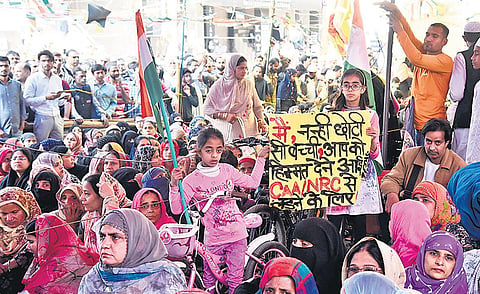

What is the earliest memory you have of this treacherous year? Mine goes back to the first week of January in the heart of Delhi where women, with the words of resistance etched on their lips, spent days and nights protesting against the BJP-led Indian government.
Protests across the country ensued after the ruling government rushed through the Citizenship (Amendment) Act in the Parliament. The contentious law fast-tracks citizenship for Hindus, Christians, Sikhs, Jains, Buddhists and Parsis from Bangladesh, Afghanistan and Pakistan excluding Muslims.
Muslim women, perhaps for the first time ever, became the voice of resistance, countering the right-wing’s chest-thumping machismo. Shaheen Bagh in Delhi became the voice of resilience.
Old, young, veiled, everyone assembled on the streets of Shaheen Bagh to make their voices heard after more than 50 people with rods and acid attacked the students and faculty of Jawaharlal Nehru University, who were then protesting against the CAA.
That winter, similar agitations sprung up in many cities across the country. Women raised slogans, read the preamble of the Constitution and recited the verses of Faiz’s ‘Hum Dekhenge’, a remarkable moment in the history of India.
In Kolkata, women braced the chill of the season to forward their cry. Although the government flipped its stance on the National Register of Citizens (NRC) multiple times, the aftermath of the delimitation exercise in Assam was enough to put fear in the minds of Muslims.
Women, in particular from the minority community, are the most vulnerable in society and when all was at stake, they did not mince their words. Solidarity poured in from every corner as a provocation by BJP leaders resulted in riots in Northeast Delhi, claiming 23 lives.
Then entered the word pandemic. Everything paused after a virus waged war with mankind and brought a stillness to our being.
As most of us privileged few were getting accustomed to the 'new normal', a humanitarian crisis unfolded. Thousands of migrant workers faced the brunt of the government's ill-managed lockdown and decided to walk back to their home states. Bruised legs traversed through unnamed roads and railway lines but for some, only their souls could reach home, their bodies in graveyards.
As the number of cases rose and deaths multiplied, the government celebrated frontline workers and caregivers. But, forgot to ensure their salaries were paid on time. ASHA workers, nurses and doctors staged protests throughout the year over unpaid salaries.
In July, trans activists took to the streets to voice their concerns over the revised draft Transgender Persons (Protection of Rules), 2020. Even though the country was deep in the throes of the lockdown, the transpersons' agitation shook the conscience of citizens.
This plague year, indeed, was the year of protest for every country ruled by a majoritarian government. From India to Hong Kong, dissenters were put behind bars despite a raging pandemic causing monumental grief.
The riots in Delhi led to the arrest of several student activists for allegedly 'inciting violence'. Intellectuals and professors allegedly behind the 2017 Bhima Koregaon violence were raided and put behind bars. Delhi University students Natasha Narwal, Devangana Kalita, Umar Khalid and professor Hany Babu were among the state victims. Social media brimmed with fury after student-activist Safoora Zargar who was then 23 weeks pregnant was put in jail.
In the US, persons of colour poured into the streets in millions to attest their right to co-exist after a 46-year-old Black man named George Perry Floyd was killed by a white police officer in Minneapolis. The collective rage towards centuries of racial discrimination and a white man's presidency gave birth to one of the biggest protests in the world's 'oldest' democracy. The Black Lives Matter protests trickled down to every corner of the world.
That autumn, Indians followed the US's footsteps and launched a Dalit Lives Matter protest after a Dalit woman in Uttar Pradesh’s Hathras was gang-raped and killed by four caste Hindu men. The apathy of the state government and state police filled the country's heart with anger and shame.
Feminist poet Muriel Rukeyser had once written, "What would happen if one woman told the truth about her life? The world would split open." And women are talking, protesting and taking back their agency.
Poland was brought to a standstill when a constitutional tribunal ruling banned almost all abortions, further tightening one of the strictest laws in the world. In October, a million women took to the streets reclaiming their authority over their bodies. The government had to back down, preventing the ruling from coming into force by refusing to publish it.
In Belarus, women have been leading protests against the country's sexist President Alexander Lukashenko, who had openly mocked the second sex for being "too weak for politics", saying "their place was in the kitchen". The women of Belarus gather weekly risking arrests and brutality to topple the 'last dictator of Europe'.
It is again winter in India and a vital section of society is protesting against the BJP government. This time, the farmers, predominantly from northern states, are bracing the chills with a demand to repeal the three farm laws passed by the Parliament in the absence of the Opposition.
Although it is mostly led by men, women too have been part of the agitation since the first day. It has been a month since the onset of the agitation and protests have only swelled at the Delhi borders.
Several of these protests may have failed and some met with brute force, but society has witnessed women's collective anger and it will never be the same.
The fourth wave of feminism often leverages online tools to fight for gender equality. However, women in this decade are not limited to hashtags but are going further to reclaim their voice, bodies and public space, one protest at a time. Onwards!